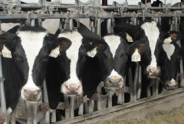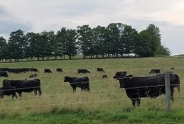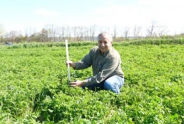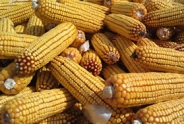Field Crop Weed Identification and Control Series 2022
Event Details
Date
February 2, 2022
February 16, 2022
February 23, 2022
March 2, 2022
March 9, 2022
March 16, 2022
Time
12-1:00 pm
Location
Virtual
Host
South Central New York Dairy & Field CropsJanice Degni
607-391-2672
email Janice Degni
February 2, 2022, Broadleaf Weed identification for crop production 12-1 pm (virtual) Bryan Brown NYSIPM.
Many of our most problematic weeds are broadleaf weeds. The best way to control them varies depending on the species, so it is imperative that weeds are identified correctly. In this session we'll go over some of the key distinguishing characteristics of the most problematic broadleaf weeds in NY field crops. For each species, we'll discuss some of the biology that makes it weedy and look for potential "Achilles heals" that can be exploited for management. We'll also review best practices for using smartphone weed ID apps.
NYSDEC credits: 1.0 CCA Credits: 1.0 PM
Registration Link
https://cornell.zoom.us/webina...https://cornell.zoom.us/webinar/register/WN_vAVpWQLZQOmRD4ESAdxwEg
February 16, 2022, Grass Weed identification for crop production 12-1pm (virtual) Caroline Marschner, Ext. Assoc. Weed Ecology, Cornell
Identifying grass and grass-like weeds can be challenging but, is necessary for good weed management. During this program we will discuss what traits to look for when identifying grasses, go over some of the common crop grass weeds, and share some resources for grass weed management.
NYSDEC credits: 1.0 CCA Credits: 1.0 PM
Registration Link
https://cornell.zoom.us/webinar/register/WN_skC9zzukQfqkzGvuuJ-6fw
February 23, 2022, Weed management in corn 12-1pm (virtual) Jeff Miller, Resource Educator, CCE Oneida County.
Weed control is an integral part of corn production. Cultural and chemical control methods should be incorporated in an integrated approach to control weeds. Cultural practices like crop rotation, tillage, and cover crops will be discussed. Herbicide families (site of action) efficacy, timing of application will be discussed for annual grasses and broadleaf weeds, perennial grasses, perennial broad leaf weeds and herbicide resistant weeds.
NYSDEC credits: 1.0 CCA credits 1.0 PM
Registration Link
https://cornell.zoom.us/webinar/register/WN_tJA7KjPDQ5mNRfnfBLvAsQ
March 2, 2022, Weed management in Soybeans 12-1pm (virtual) Mike Hunter, Regional field crop specialist, CCE North Country Regional Ag Team
Implementing integrated weed management practices in soybean production will be the focus of this presentation. Mike Hunter will share results from three years of on-farm soybean herbicides trials in New York State. He will provide the current status of herbicide resistant weeds in New York, and discuss effective herbicide resistant weed control strategies and how to manage resistant weeds on your farm.
NYSDEC credits: 1.0 CCA credits 1.0 PM
Registration Link
https://cornell.zoom.us/webinar/register/WN_PlVxcqFaQay0XrP1nQiUyQ
March 9, 2022, Weed management in hay and pasture 12-1pm (virtual) Janice Degni, Team Leader and Field crops specialist, CCE SCNY regional team
Weed Control for Hay Crops and Pastures
This session will provide a review of cultural and chemical weed control practices for clear alfalfa or grass, mixed stands, and pasture. It will include practices that give the hay species a competitive edge over weeds and herbicide options for different weed scenarios. Common difficult to control weeds in pasture will be covered as well as improvement of older hay stands with weed invasions.
NYSDEC credits: 1.0 CCA credits 1.0 PM
Registration Link
https://cornell.zoom.us/webinar/register/WN_a-V74i04Qc-1xiS4zenWxA
March 16, 2022, Alternative weed control and weed seed management 12-1pm (virtual) Lynn Sosnoskie, Asst. Prof. of weed ecology and specialty crop systems, Cornell
Weeds are a significant threat to crop production due to 1) competitive interactions that limit yield potential, 2) physical interference that reduces harvest efficiency, and 3) serving as an alternate host for pests and pathogens. The evolution of herbicide resistant weeds (in particular marestail/horseweed/Canada fleabane, Palmer amaranth, waterhemp) further complicates weed control efforts by limiting the utility of commonly applied chemical tools. This talk will focus on the current state of herbicide resistance in NY and the future of chemical weed control. Novel weed management strategies, such as harvest weed seed control (HWSC) and electrical weeding will be discussed and recent research updates provided. Best management practices for suppressing unwanted vegetation, including combine and equipment clean-out to limit seed spread, will also be presented.
NYSDEC credit: 1.0 CCA credit 1.0S
Registration Link
https://cornell.zoom.us/webinar/register/WN_-1ANbfA5Tq2slCum5Dmicg
Upcoming Events
Swine Production Zoom Series
February 5, 2026
February 19, 2026
March 5, 2026
March 19, 2026
April 2, 2026
Register for the whole series or for one or several sessions.
Announcements
Statewide Field Crop Pathology Needs Assessment Survey
Your input is wanted for identifying priorities!Sign Up for Our Weekly E-Newsletter
We send out a bi-weekly e-newsletter that has announcements, upcoming programs, and opportunities for you! Registration is quick, easy, and free. Click here to sign up today!Farmers Can Join MeatSuite For Free!
MeatSuite.com is a free resource provided by Cornell University where NY meat farmers can create a farm profile and list their bulk (wholes, halves, quarters) and bundled (i.e. Grilling Bundle) meat products.Why should farmers join?
1. It's free and easy!
2. Connect with more local customers. In the past year the MeatSuite.com farm directory had 8,300 visits from New York consumers. Farm profiles get as many as 25 views per month from potential local customers. We also spotlight MeatSuite farms on social media and bring attention and purchases to farms through highlights and giveaways.
How do I join?
Farmers can visit https://www.meatsuite.com/farmers/ to create a free farm profile. You must list at least one product for your farm's profile to go live. You'll also have access to Cornell's free Meat Price Calculator, a helpful tool for pricing your meat to make a profit.
While you're on MeatSuite, check out the "Creating Consumer-Friendly Bulk Meats" publication on the log-in page. It has tips on how to create bulk meat products that are easier for first-time buyers to say "yes" to.
If you have any questions as you create your farm profile or products, we're here to help! Please email Matt LeRoux at mnl28@cornell.edu.





